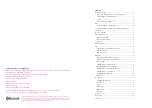
MIO–CCE–4K/3G
SMPTE ST 2110/4K/3G/HD/SD Closed Caption Encoder with Media–to–IP Streaming
Revision 1.0
Page - 57
Example results:
UTC is 19:47:39, Time zone is 05:00, DST is ON DSO is ON
Command:
^Ac<sp>hh:mm:ss<sp>hh:mm<sp>dst<sp>DSO=dso<cr>
hh:mm:ss
Local time
hh:mm
Time zone offset
dst
OFF Daylight Saving Time not in effect (DST
Bit Off)
ON
Daylight Saving Time in effect
(DST Bit On)
dso
OFF Daylight Saving Time not observed in
this region (DSO Bit Off)
ON
Daylight Saving Time observed in this
region (DSO Bit On)
Although the time zone must be entered as hours and minutes, the XDS Time Zone
packet will only transmit the time zone hours. This is a limitation of the definition of
the time zone packet in CEA-608.
Example:
^Ac<sp>13:10:00<sp>5<sp>ON<sp>DSO=ON<cr>
Set local time to 1:10 pm in EDT (Daylight Saving Time in effect), Daylight Saving Time
observed.
^Ac<sp>13:10:00<sp>5<sp>ON<sp>DSO=OFF<cr>
Set local time to 1:10 pm in EST (Daylight Saving Time in effect), Daylight Saving Time not
observed. (i.e. As in Indiana)
^Ac<sp>06:10:00<cr>
Set local time to 6:10 am. Time zone, DST and DSO unchanged.
^Ac<sp>13:10:00<sp>4:30<sp>OFF<sp>DSO=ON<cr>
Set local time to 1:10 pm in Newfoundland Time Zone with Daylight Saving Time not in effect,
but Daylight Saving time observed
The DST bit instructs the encoder whether Daylight Saving Time is currently in effect. The DSO bit instructs
the encoder whether Daylight Saving Time is observed in this region. The encoder must know this
information when converting between local time and UTC time internally. Most regions in North America
observe Daylight Saving Time according to the following rule: ON in the summer; starting on the second
Sunday in March. OFF in the winter; starting on the first Sunday in November. Other parts of the world
follow different rules for DST.
















































